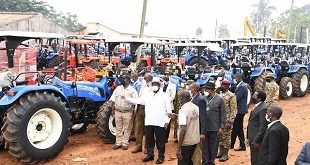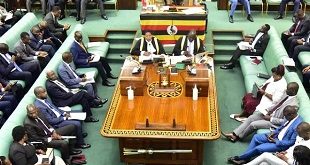
By Patrick Matsiko Wa Mucoori
The year is 2011 and the number of districts in Uganda has hit 150 and is still growing. The opposition and civil society are foaming at the mouth about the government’s increasing public expenditure on administration when social services have totally shrunk and decayed. There is general outcry that Uganda is over-governed and that the national treasury has been over-stretched by the big number of dependent districts which is increasing the burden on the country’s shrinking tax base. The President of the Republic of Uganda and commander in chief of the armed forces has convened an extraordinary NRM Caucus meeting at State House to explain these issues.
He clears his voice, stammers a little and starts his address: “Ladies and gentlemen, the opposition and other obscurantists are making noise that the number of districts will aggravate our public expenditure yet social services like roads, educations, health, etc have gone to the dogs and schools lack classrooms, textbooks and laboratory equipment. I have also heard others claim that these districts are dependent on the central government. Hawo ni wajinga kabisa. They are like the Jaluos who uprooted the Uganda railway. They don’t understand what delivering services to the people means. It’s not availability of medicine in public health centres, good roads, well paid teachers or better grades in examination results. For us in the NRM, our revolutionary understanding of delivering services nearer to the people is to give them as many districts as there are tribes and clans in the country. It makes a lot of sense. You see, with a new district every tribe and or clan will have a district police commander, district internal security officer, a resident district commissioner etc.
This means people’s security is guaranteed. That was one of the key issues in our 10-point programme in the bush. Then you will no longer hear soldiers shooting people dead in pubs like we saw at Top Pub on eh eh”¦Wilson Road, sorry William Street. What’s the use of having good roads, good schools with highly paid teachers and children passing with Grade Ones when their security is not guaranteed?
Another critical point is to take jobs nearer to the people but these opposition and civil society obscurantists cannot see such important achievements for our people. With every new district, there will be an education officer even if pupils are studying under trees, director of health services even if there is no healthcare in hospitals, an LC-V council even if the councillors can’t sit for lack of allowances, then LC-V chairman and district woman MP, a chief administrative officer although his budget depends on grants from central government”¦ etc. These are many jobs. You can see how those complaining about many districts do not understand the science of labour and employment. I will take them to Kyankwanzi for chaka mchaka. There is no point in having quality education and medicine in hospitals when you are jobless. After all, for treatment we can use our traditional local herbs which our ancestors used such as omuteete, omubirizi… They made their lifespan longer than ours today. In fact these herbs are better than European medicine which sometimes causes shukari (diabetes) and pressure. They cure first, are cheaper and have no side effects. So you see how rich in medicine Uganda is. The problem is not lack of medicine in hospitals. It’s because these opposition, enemies of homegrown development, have confused our peasants and told them not to take herbs. Our biggest challenge now is to create jobs. Education and medicine, are simple issues which can be solved by our new breed of patriotic cadres. That’s why we have set up patriotic clubs throughout the country. The other day I ‘passed out’ 1,000 cadres from chaka mchaka at Kyankwanzi.
At such a supersonic speed we are creating jobs for every district, no tribe or clan will still complain about marginalisation.
I have heard others say that parliament is too big and its size should be reduced. They do not have the right vision. Uganda’s problem is not over-representation or being over-governed as FDC and other opposition anarchists claim. In fact the problem is under-representation. That’s why, in my vision, we should also have MPs for the elderly, vendors, boda-bodas, teachers, tenants, herdsmen etc. I only have reservations about the police. You know they have been voting wrongly. That’s why I doubt their patriotism. But that is being sorted out. We are integrating UPDF cadres into the police.
Then there are these marginalised patriotic Ugandans who sacrificed their lives for the defence of this country. The Amuka Boys, Home Guards, Vigilantes, Arrow Boys have done a lot to protect the wananchi against Joseph Kony and his killers. They should also have their own MPs.
When we started creating districts and new seats in parliament, many people did not take us seriously. But they are now waking up. Those who claim that most districts will increase the burden on the central government are part-time thinkers. They must be blind. You see when we have more districts the donors will give us more financial aid for local governments. How can a normal person not see this?
We still have a small problem in Bushenyi. But we shall sort it out. You can imagine a few stubborn Banyankore are resisting the splitting of Bushenyi into more districts. They must stop this intransigence. The Banyaruguru should have a district. These people in Buhweju, I think they are Bahweju, should also have a district of their own. Why should we have one big Bushenyi district? This is not East African federation. That’s ujinga kabisa.
But I am happy that other tribes have understood our strategic vision. When the Kakwa complained about marginalisation, we gave them Koboko. The Lugbara got Maracha-Terego. We gave the Sabiny the district of Bukwa, although the only road going there is through Kenya. The Bagungu were given Buliisa and they kept quiet. We gave the Labwor-Karimojong, Abim although it cannot pay its district councillors. But that’s not a big problem. Abim is very small so the councillors can ride their bicycles to attend the LC-V meetings. Bicycles are cost effective because they don’t use fuel. The councillors can also carry their own food from home so they don’t need meal allowances.
The councillors award tenders. Why can’t they get kitu kidogo from the contractors?
That’s part of the fundamental change we ushered in 1986. With those few words, I adjourn this meeting.
pmatsiko@independent.co.ug
 The Independent Uganda: You get the Truth we Pay the Price
The Independent Uganda: You get the Truth we Pay the Price


